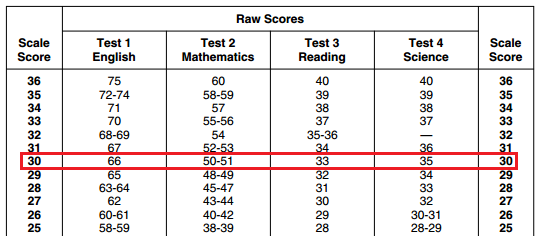
A 30 ACT score is a solid goal to have for test day. But how difficult is it to get a 30? How many questions can you miss? And what kinds of schools can you get into with a 30?
In this guide, we teach you how to get a 30 on the ACT with our nine top tips, covering everything from starting your prep through picking answers on test day. In fact, the tips in this article will help you even if you're shooting for a higher or lower score, like a 32 or a 29.
But first, what are the benefits of getting a 30?
Can You Get a 30 on the ACT? Why Aim for a 30?
In short, yes, you can get a 30 on the ACT—as long as you're willing to dedicate a lot of effort to your prep. Be aware, though: getting a 30 will be easier for some students than it will be for others. How easy (or difficult) it is for you ultimately depends on where you're currently scoring and how much time you can commit to studying.
But why 30? Is 30 a good ACT score? According to percentiles, an ACT score of 30 is quite high. Data collected by ACT, Inc., shows that a 30 corresponds to the 94th percentile. In other words, very few test takers—only 6 percent—score 30 or higher on the ACT, making it a great score to aim for on test day.
Getting a 30 offers a couple of benefits to test takers. One is that it can help make up for less impressive parts of your college application. For example, if you had a lower GPA, an ACT score of 30 could make your application more impressive to schools by showcasing your test-taking skills and proficiency in ACT topics.
Another benefit is that you’ll have a better shot at getting accepted to competitive schools. With a score of 30, you’ll be just around average for admitted students to many selective private schools, such as Boston University and Rensselaer Polytechnic Institute. You’ll also be in the 75th percentile (that is, at a very good advantage!) for numerous public universities, including UMass Amherst and UC Santa Barbara.
On the other hand, a 30 is low for extremely competitive schools. For Ivy League schools such as Harvard and Princeton, a 30 places you below the 25th percentile, meaning you’ll have a very small chance of getting accepted.
 Too bad the ACT doesn't test how proficient you are in hitting people in Mario Kart. (Giancarlo Marseglia Ceccoli/Flickr)
Too bad the ACT doesn't test how proficient you are in hitting people in Mario Kart. (Giancarlo Marseglia Ceccoli/Flickr)
What’s Needed to Get a 30 ACT Score?
A 30 ACT score means scoring highly on all sections of the exam (excluding Writing, as this optional section score does not affect your composite score). Because your composite score is the average of your four section scores (English, Math, Reading, and Science), you must aim for at least a composite ACT score of 29.5—or around 30 on each section.
These section scores can vary. For example, you could aim for scores in the upper 30s on your stronger sections and scores in the upper 20s on your weaker sections and still get a composite score of 30. To do this, however, you'll always need to score at least 30 on two or more sections of the exam.
Here are some ways you could get a composite ACT score of 30:
- 30s on all four sections.
- 30s on two sections and 29s on the other two.
- 32s on two sections and 28s on the other two.
- 32, 31, 29, and 28 on the four sections. (And so on.)
So how many correct answers do you need to get a 30 on the ACT? In truth, the answer varies depending on what test you take. Since all ACTs differ slightly in difficulty, the number of questions you must answer correctly to get a 30 also varies slightly with each test.
Below, we’ve analyzed five score conversion tables from official ACT practice tests to calculate approximately how many questions you must get right to get a 30 on each section of the exam. (Remember, you don’t necessarily need to get 30s on all four sections, but you will need to get 30s on at least two sections.)
After averaging the conversions, here's what we discovered:
|
To get a 30 on ... |
You’ll need an average raw score of ... |
Meaning you can miss around ... |
|
English |
67 |
8 questions |
|
Math |
51 |
9 questions |
|
Reading |
34 |
6 questions |
|
Science |
36 |
4 questions |
Once again, these numbers are all approximations based on the average number of raw points you'd need to get 30s on five different ACT practice tests. The chart above indicates that you can miss the most raw points on Math and the least on Science. You can also miss several questions on English and slightly fewer on Reading to get a 30.
Here is an example of an ACT scoring chart, with score conversions to 30 highlighted:

Overall, you can’t miss more than a small handful of questions on each section of the ACT if you’re hoping to score a 30. To avoid missing too many questions, you must ultimately learn what to expect on test day and how to study effectively for each ACT section. We teach you how to do this next.
 Tip #0: don't build a pillow fort to try to hide from the ACT.
Tip #0: don't build a pillow fort to try to hide from the ACT.
How to Get a 30 on the ACT: 9 Key Tips
Getting a 30 isn’t easy, but it’s certainly not impossible—you just need to know how to prepare. Our top nine tips below teach you how to get a 30 on the ACT and give you the confidence you'll need for test day.
#1: Create a Study Plan
When aiming for a 30 on the ACT, you'll definitely want to use a study plan to guide your prep, ideally one that specifically prepares you for getting a 30.
Start by taking an official ACT practice test to get your baseline score. This is the score you start out with before beginning any ACT prep.
As you take the test, try to recreate real testing conditions to give yourself a more accurate indicator of your scoring ability. This means you'll need to minimize potential distractions, take the test in a quiet room, and time yourself using the official time limits.
Once finished, use your test’s scoring guide to calculate your section and composite scores. The composite score (out of 36) you get will be your baseline score.
Next, subtract your baseline score from your goal score (in this case, 30) to see how many points you'll need to improve by to hit your goal score. Match this difference to one of the point ranges below to see the approximate number of hours you’ll need to study:
- 0-1 point improvement: 10 hours
- 1-2 point improvement: 20 hours
- 2-4 point improvement: 40 hours
- 4-6 point improvement: 80 hours
- 6-9 point improvement: 150 hours+
For example, if I scored 26 on a practice test, I’d need 4 points to hit my goal score of 30. Using the list above, we can see that this difference corresponds roughly to 40-80 hours of prep time.
Once you’ve figured out the number of study hours you'll need to do, draft a study schedule that works well for you. You should try to study consistently every week until test day, so make sure to divide up your time appropriately. In addition, try to plan around any obligations you have in the time leading up to your test.
#2: Use High-Quality Study Materials
To get a 30 ACT score, you’ll need to use the best ACT resources currently available. This means no low-quality prep books, no sketchy websites, and no inefficient apps.
By far the best resources to use are official ACT materials, many of which are completely free! Popular options include official ACT practice tests, sample questions, and The Official ACT Prep Guide, which currently sells for around $25 on Amazon.
Be pickier when choosing unofficial ACT materials. I recommend only opting for those that are highly rated and contain realistic practice questions with comprehensive answer explanations. (Bonus if it includes helpful test-taking tips!) Our guides to the best ACT prep books, apps, websites, and vocabulary lists can give you more info on what unofficial resources to use.
In short, always remember that quality beats quantity. There’s no point in getting tons of ACT resources if they’re not going to actually help you understand the test and get the 30 you want, so only get whatever you think will be most useful.
#3: Track Your Progress Using Practice Tests
An ACT study plan not only helps you space out your prep sessions but also allows you to track your progress.
Throughout your studies, it's important to take occasional full-length practice tests to see whether your score is improving. How many tests you take and how often you take them depends on the amount of time you have left before test day. Generally, it’s helpful to take a test every few weeks (but never right before test day!).
Once you’ve calculated your score for a practice test, use this to see whether your score is, on average, rising or staying the same. If it’s not rising as quickly as you want it to, consider what kinds of concepts or topics you can focus on more to help raise your score on another attempt.
 My biggest mistake? Eating eight boxes of Girl Scout cookies within a week. (brian/Flickr)
My biggest mistake? Eating eight boxes of Girl Scout cookies within a week. (brian/Flickr)
#4: Analyze Your Mistakes
When aiming high on the ACT, you’ll need to understand exactly what you’re getting wrong and what you can do to fix your mistakes.
As you review your answers to ACT practice questions and tests, don’t just mark the correct answer and move on—take a few minutes to think deeply about why you might’ve missed a certain problem. I recommend doing this before you look at the answer explanation as a way to sharpen your problem-solving skills.
After, re-solve the problem and use the correct answer to guide your thinking. For example, if you thought the answer to a math question was 13 but it was really 36, go through the entire problem again, this time using a different approach to see whether you can find the correct answer on your own.
#5: Drill Your Weaknesses
Weaknesses will keep you from getting an ACT score of 30. They prevent you from getting certain questions right, even when you’ve studied the concepts. So how do you overcome your weak spots? First, by simply understanding what they are.
To see what concepts you struggle the most with, go over all of the ACT practice tests and questions you've completed and try to look for patterns in the questions you got wrong. For example, are you always missing geometry questions? Do you spend too much time on big-picture questions?
Once you know what’s bringing down your score, you can then focus on drilling these weak spots in your prep. This means you’ll need to practice the questions you get wrong, review relevant strategies, and monitor your performance through practice tests to ensure you’re improving.
#6: Get Key Strategies Down Pat
No matter what score you're aiming for, you should always familiarize yourself with the most useful ACT strategies before taking the test. By "strategies," I mean test-taking approaches and tricks you can use to increase your chances of getting a high score (ideally, a 30!).
Some ACT strategies target certain sections of the exam, whereas others apply to the entire test. Not all strategies will necessarily suit you (for example, it's best to pick just one passage-reading strategy that works well for you), but you should always try out all major approaches before choosing one to stick with.
Before we dive into section-specific strategies, here are the three general ACT strategies you should be using on test day:
- Answer every question. There's no penalty for incorrect answers on the ACT, so try to answer every question, even if you have to guess. Because each question is multiple choice with four or five answer choices (only Math questions have five answer choices—everything else has four), you’ll always have at least a 20-25 percent chance of getting it right.
- Skip hard questions and return to them later. If you come across a question you can’t solve within a reasonable amount of time (see #7), mark the question and proceed to the next one. Then, once you finish the section, go back to any marked questions and try to approach them with a fresh perspective.
- Use the process of elimination. Not sure which answer choice is correct? Narrowing down your choices can dramatically raise your chance of getting the question right. For example, by eliminating three answer choices for a math question, your possibility of answering it correctly rises from 20 to 50 percent!
For additional ACT tips and strategies, check out our individual section guides:
English
- The Top 9 ACT English Strategies You Must Use
- The Best Way to Approach ACT English Passages
- How to Get 36 on ACT English: 9 Strategies From a Perfect Scorer
Math
- Plugging in Numbers: a Critical SAT/ACT Math Strategy
- Plugging in Answers: a Critical SAT Math/ACT Math Strategy
- How to Guess Strategically on ACT Math
- How to Get 36 on ACT Math: 8 Strategies by a Perfect Scorer
Reading
- The #1 Critical, Fundamental Strategy of ACT Reading
- The Best Way to Approach the ACT Reading Passage
- How to Answer ACT Reading Questions: 5-Step Guide
- How to Get 36 on ACT Reading: 11 Strategies From a Perfect Scorer
Science
- The 5 Best Strategies for Reading ACT Science Passages
- The 11 ACT Science Strategies You Must Be Using
- The Hardest ACT Science Questions and Strategies to Solve Them
- How to Get 36 on ACT Science: 13 Strategies From a Perfect Scorer
Writing
- ACT Writing Rubric: Full Analysis and Essay Strategies
- ACT Writing Tips: 15 Strategies to Raise Your Essay Score
- Why You Shouldn’t Copy Skeleton Templates for the SAT/ACT Essay
- How to Get a Perfect 12 on the ACT Writing Essay
 The #1 strategy for Monopoly? Flip the board into the air and play Sorry! instead.
The #1 strategy for Monopoly? Flip the board into the air and play Sorry! instead.
#7: Use Your Time Wisely
Another key strategy we didn't mention above is to use your time wisely on each section of the ACT. Being able to allocate your time appropriately means you won't be spending too much (or too little) time on certain questions.
The chart below shows how much time you have per question on each ACT section. These limits are estimates in that they assume you'll spend the same amount of time on every question.
|
ACT Section |
Time Per Question |
|
English |
36 seconds |
|
Math |
60 seconds |
|
Reading |
53 seconds |
|
Science |
53 seconds |
As you can see, you’ll have the least amount of time per question on English and the most on Math. But even a whole minute can fly by on a math question, so you'll need to know how to approach ACT problems fast yet effectively. For tips on how to pace yourself, check out our time management guides for ACT Math, Reading, and Science.
As I mentioned in tip #6, it's a good idea to answer every question since there's no penalty for incorrect answers. But the time crunch is one of the most challenging parts of the ACT, often making it difficult to finish certain sections in time or get lengthier, more complicated questions correct.
Therefore, if you're aiming for a 30, it may be better for you to spend a little more time trying to get questions right than to worry about trying to solve every question. You know you'll be missing a few points anyway, so use the time you would've spent answering tougher questions on solving the questions you're absolutely certain you can get right with a little extra time. Then, just guess on the few you don't have time for.
#8: Avoid Careless Errors and Double-Check Your Answers
High scorers on the ACT primarily miss questions due to careless errors—that is, questions you misread or misinterpreted, answer choices you didn't fill in correctly, or answer choices you didn't confirm were correct before moving on to the next question.
These types of errors, though frustrating, are entirely avoidable. The good news is that these errors mean you’re not struggling with the content of the exam, but the bad news is that you’re losing points on questions as a result of mere hastiness.
The best way to avoid making careless errors is to double-check your answers. This means you'll look over each answer before proceeding to the next question. So on a math question, you could quickly double-check your answer choice by plugging it back in and re-solving. Or on an English question, you could reread the sentence you’ve corrected to ensure it sounds accurate.
If you have extra time at the end of a section, go back through each question to check that you’ve answered all of them and have marked the appropriate answers on your answer sheet.
Here are some additional tricks you can use to prevent careless errors:
- Read all questions carefully. If you skim, you might misunderstand what the question is asking you to do. For example, on Math, this could mean you accidentally solve for the wrong algebraic expression. Therefore, always read every word in a question.
- Reread any part of a question you don’t understand. You can't expect to get a question right if you don't get what it's asking you to do. If there's any phrase or word throwing you off, reread the question until you're pretty sure you know what it means.
- Read all of the answer choices before choosing one. Don't just go straight for the answer choice you think is right—often, what sounds correct isn't actually correct, as many plausible answer choices are included in order to mislead you. Read through all of the answer choices so that you can be certain you know which is right.
- Write neatly. If your notes are sloppy or confusing (especially when solving for math problems), you'll likely struggle to make sense of what you've written and might even choose the wrong answer as a result. Always write cleanly and coherently so that you don't accidentally foil your own efforts on test day.
#9: Don’t Psych Yourself Out
Last but not least, don’t let the pressure of the ACT freak you out. Getting a 30 takes hard work, but you shouldn't overwhelm yourself or feel as though your future depends on an ACT score. As long as you’ve got a solid study plan and quality ACT resources, you’re well on your way to getting a great score.
Additionally, try to remain calm on test day. A little anxiety is expected, but letting your nerves get to you can make you lose both your concentration and confidence. If you don’t get a 30, remind yourself that it’s not the end of the world; you can always retake the exam or work on improving other parts of your college application. Your chances of college acceptance aren't determined solely by your ACT score, so don’t assume you’re doomed with anything below a 30!
 Don't look like this after you take the ACT. Seriously. Don't magically turn into a dog.
Don't look like this after you take the ACT. Seriously. Don't magically turn into a dog.
Conclusion: How to Get a 30 on the ACT
Many students aim for a 30 on the ACT, but is 30 a good ACT score? Absolutely! In fact, a 30 ACT score is very competitive—in the top 4 percent of test takers, to be exact. This score gives you a solid shot at getting into many moderately competitive universities, such as UC Santa Barbara and Boston University.
To get a 30, you must score highly on all four sections of the exam (excluding Writing). Specifically, you’ll need to get at least a 30 on two sections and a composite score of 29.5 (which rounds to 30) or higher. This means you can only miss a handful of questions on each section.
Above, we taught you how to get a 30 on the ACT using our top nine tips. As a reminder, here are our tips again:
- Come up with a foolproof study plan
- Obtain high-quality resources (official ones are a great place to start)
- Track your progress with practice tests
- Analyze your mistakes on tests and questions
- Drill your weak spots so that they don’t bring down your score
- Learn and practice all major ACT strategies
- Use your time wisely
- Avoid making careless errors by double-checking your answers and reading more closely
- Focus on doing well without psyching yourself out
Armed with these tips, you'll be on your way to getting a 30 in no time!
What’s Next?
Want to aim even higher—say, for a perfect 36?Then check out our in-depth guide to getting a perfect ACT score, written by a real full scorer.
What's considered a good ACT score? Our expert guide goes over what ACT scores and percentiles you'll need to aim for in order to be considered a competitive applicant for your schools.
What about bad ACT scores? How low is too low? If you're not sure where your score stands, read our guide to low ACT scores to learn what's considered a poor ACT score. Then, get tips on how to improve.
Want to improve your ACT score by 4 points?
Check out our best-in-class online ACT prep classes. We guarantee your money back if you don't improve your ACT score by 4 points or more.
Our classes are entirely online, and they're taught by ACT experts. If you liked this article, you'll love our classes. Along with expert-led classes, you'll get personalized homework with thousands of practice problems organized by individual skills so you learn most effectively. We'll also give you a step-by-step, custom program to follow so you'll never be confused about what to study next.
Try it risk-free today:
These recommendations are based solely on our knowledge and experience. If you purchase an item through one of our links, PrepScholar may receive a commission.
Have friends who also need help with test prep? Share this article!

Hannah received her MA in Japanese Studies from the University of Michigan and holds a bachelor's degree from the University of Southern California. From 2013 to 2015, she taught English in Japan via the JET Program. She is passionate about education, writing, and travel.


































 Holly R.
Holly R.